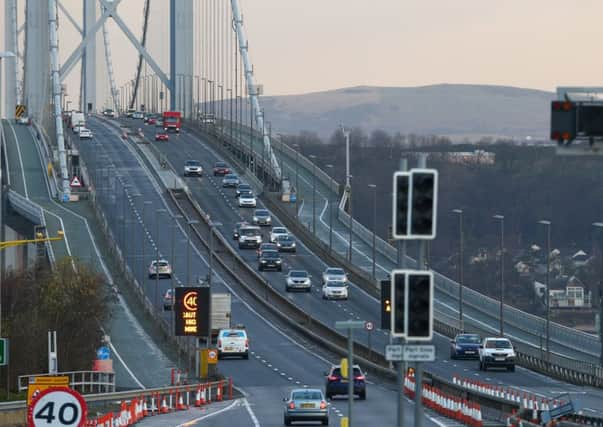Comment: Forth Road Bridge closure should prompt a rethink


As a resident of the Wee County, working at Pitreavie in Dunfermline and travelling frequently to clients in Edinburgh, the re-opening of the Forth Road Bridge is a welcome piece of news. Boy, have we missed that vital link.
There is no doubt the closure has had a massive impact on businesses around Edinburgh and throughout central Scotland. Those of us who work in Fife with connections south of the Forth have all had to re-arrange our lives to deal with long commuter delays.
Advertisement
Hide AdAdvertisement
Hide AdFor many Scottish businesses, the implications have been acute with less time spent by staff at work, meetings cancelled, hauliers’ routes increased, and crucial time lost for many Scottish companies in the vital lead-up to Christmas.
It has definitely had a detrimental impact on Scotland’s productivity – and that has to be a concern for the Scottish Government, because it is well-reported that Scotland is falling behind in the international productivity league tables.
While the post-mortem on why the bridge was closed is an issue for other commentary slots, it also raises a topical issues about the way we look at work in Scotland as 2016 arrives.
Technology remains key to allowing more flexible working, although serious concerns remain about the variable quality of Scotland’s mobile infrastructure and the speed (or lack of speed) of broadband in rural areas.
In any case, businesses have to be more flexible about giving staff extra time to get to work where appropriate, or about start and finishing times to the working day.
There are still too many workplaces ruled by the tyranny of a 9-5 existence, when they have the opportunity to be more creative.
Managements need to give more thought and consideration to home working, or put in place arrangements with other businesses about using offices more local to where staff live, so they don’t have to commute. Surely, this is an environmental issue too?
Of course, this depends on the nature of job, and how easy and effective it is to monitor someone working from home – and not on the golf course or shopping.
Advertisement
Hide AdAdvertisement
Hide AdHere, as an employment lawyer, it raises the question of why businesses use expensive premises in the centre of cities which are under-utilised much of the time. Satellite working, again using the latest technology, has to be embraced in 2016, with more digital hubs for transient workers.
We also need to consider how we reduce the number of journeys undertaken by large HGVs. Why, for example, are there now so many vans delivering single items of clothing, technology, food, etc, from online delivery firms?
We need to start thinking about out how many of these journeys are absolutely necessary and what we can do to have a positive impact on our society and environment.
Perhaps the bridge closure will act in a small way as a catalyst for businesses to affect more change in the workplace. Let’s only make the journeys for work and for leisure that are truly needed.
• Ben Thornber, of Thornber Employment Law, based in Dunfermline, is a member of the United Employment Lawyers’ network, with 50 locations across Scotland www.unitedemploymentlawyers.co.uk